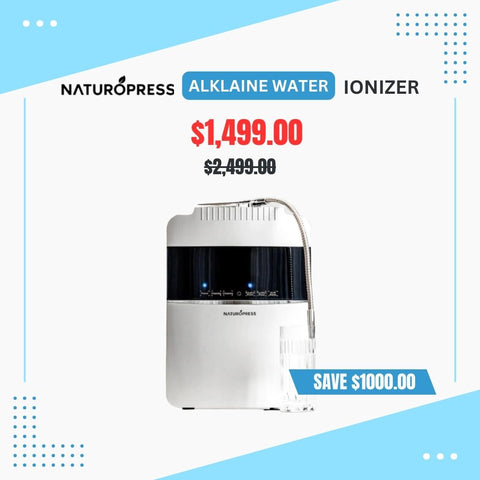Unlock the wonders of combining ionized alkaline water with your favorite tea and discover why this is the ultimate beverage for health enthusiasts.
In today's quest for health and wellness, both alkaline water and tea have gained immense popularity. But what happens when these two beverages meet? Discover the effects, benefits, and the art of crafting the perfect cup. This article will quench your thirst for knowledge, revealing how this fusion can be a game-changer.
What is the Definition of Alkaline Water?
Alkaline water, with a pH level higher than regular drinking water, is believed to neutralize acidity in the body. This is achieved through the ionization process, wherein water is passed through an alkaline water ionizer to separate it into acidic and alkaline components. Advocates claim its potential benefits include anti-aging, keeping a pH balance in the body, and better hydration due to its mineral content like calcium, magnesium, and potassium.
Why Tea? The Ancient Beverage with Modern Benefits

Tea, consumed for centuries, is more than just a beverage. Whether it's green tea or black tea, each cup offers antioxidants that combat free radicals. Drinking tea also has potential benefits like improving mental alertness and aiding digestion. Paired with alkaline water, the tea's effects could be amplified, promoting an even healthier beverage choice.
How Does Tap Water Compare to Alkaline Water?
Tap water's pH can range, but how does it stand against alkaline water or spring water? Alkaline water, with its higher pH level than regular tap water, boasts additional alkaline minerals beneficial when making tea. While tap water is generally safe to drink, the quality can vary based on local water sources.
Is Tea Made Better with Alkaline Water?
Using alkaline water to brew tea can enhance the tea taste. The alkalinity can potentially extract more flavors from tea leaves, making for a richer and more aromatic cup. Moreover, the added minerals in alkaline water can further enhance the overall drinking experience.
Finding the Perfect Cup of Tea using Alkaline Water
For tea enthusiasts, water quality matters. Regular water can significantly impact the brewing process and the final taste. Alkaline water, with its unique composition, can complement different types of tea. For example, a green tea made with alkaline water might taste smoother and less acidic. Water quality is vital for tea enthusiasts. Alkaline water, with its unique composition, can complement teas. For instance, a green tea made with alkaline water might taste smoother. Curious about the taste? Discover what alkaline water tastes like.
The Mineral Water Debate: Good for Tea?
Mineral water, naturally alkaline, is often considered a good choice for brewing tea. The minerals in the water, such as calcium and magnesium, can enrich the flavor profile of the tea. However, it's essential to balance and avoid hard water, which might make the tea taste flat.
Gallic Acid in Tea: What’s Its Role?
Gallic acid, found in teas, especially black tea, has antioxidant properties. When tea is brewed with alkaline water, the presence of gallic acid can potentially be more pronounced, enhancing the antioxidant properties of the beverage.
Alkaline Water Compared: Store Bought vs Ionized

Store-bought alkaline water and ionized water from water ionizers may seem similar, but there are differences. While both types are alkaline, ionized water can offer a fresher taste due to the ionization process. This can impact the taste and quality of the tea brewed with it.
How Alkaline Water Enhances the Effects of Tea
Using a water filter with reverse osmosis for an alkaline pH can amplify tea's virtues. This water also works to counterbalance some teas' acidity, yielding a silkier beverage. Moreover, the minerals present in the filtered water complement the innate attributes of tea, crafting a balanced and beneficial concoction.
The Buzz Around Alkaline Tea Recipes
Beyond regular brewing, there's a growing trend of crafting recipes with tea and alkaline water. Alkaline tea recipes aim to merge the benefits of both components, producing beverages that not only taste great but are also loaded with health benefits.
Key Takeaways:
- Alkaline water and tea create a refreshing and healthful beverage.
- The pH level and minerals in alkaline water can enhance the taste and benefits of tea.
- While tap and mineral waters have their merits, alkaline water can elevate the tea-drinking experience.
- Experiment with alkaline tea recipes to find your perfect blend.
FAQ: Alkaline Water and Tea
-
Is it safe to mix tea with ionized alkaline water? Yes, it's safe to blend tea with ionized alkaline water. In fact, making tea with alkaline water can enhance the overall experience by potentially improving the taste and maximizing the benefits of the tea.
-
Does alkaline water affect the antioxidant properties of tea? Alkaline water may affect the taste and extraction of compounds from the tea leaves, but the antioxidant properties remain intact. The combination might even complement the antioxidant benefits of the tea.
-
What's the difference between tap water, bottled water, and ionized alkaline water for brewing tea? Tap water and bottled water have different mineral compositions and pH levels. Ionized alkaline water, on the other hand, has a higher pH and is processed through an ionization method. For tea brewing, the water type can influence taste, with many finding ionized alkaline water enhances the flavor. Learn more about the difference between alkaline water and distilled water or how it compares to spring water.
-
Why might one choose ionized water over regular or distilled water for making tea? Ionized water often has a smoother and sweeter taste due to the ionization process. Compared to distilled or regular water, it can offer a unique tea-drinking experience by accentuating certain flavors in the tea. For those interested in the differences, here's a detailed comparison of alkaline water vs distilled water.
-
Are there any special recipes or methods for making tea with alkaline water? There aren't strict recipes, but some suggest that using alkaline water can reduce brewing times or require a slightly lower temperature. It's best to experiment and find the perfect cup of tea suited to your taste. For more on this, explore the nuances of making tea with alkaline water.
-
I've heard about ORP in the context of alkaline drinks. What is it? ORP stands for Oxidation-Reduction Potential. It's a measure used to determine the quality of ionized water. A negative ORP value indicates that the water possesses antioxidant properties, which can be beneficial. To understand the science behind this, check out our guide on the benefits of alkaline water.
-
Can I drink ionized alkaline water daily like regular drinking water? Yes, you can drink ionized alkaline water daily. However, it's essential to listen to your body and monitor how you feel. Some people believe that alkaline water offers health benefits, while others maintain it's just a refreshing alternative to regular drinking water. For guidance on daily intake, refer to our guide on alkaline water daily intake.
-
Are there any acidic foods or beverages I should avoid when drinking alkaline water regularly? While there's no strict list, it's essential to maintain a balanced diet. If you're drinking alkaline water to maintain a certain pH level in your body, consuming highly acidic foods and beverages, like lemon juice or acidic coffee, in excess might counteract the intended benefits. For more insights on balancing pH, read about the importance of maintaining a healthy pH balance.



